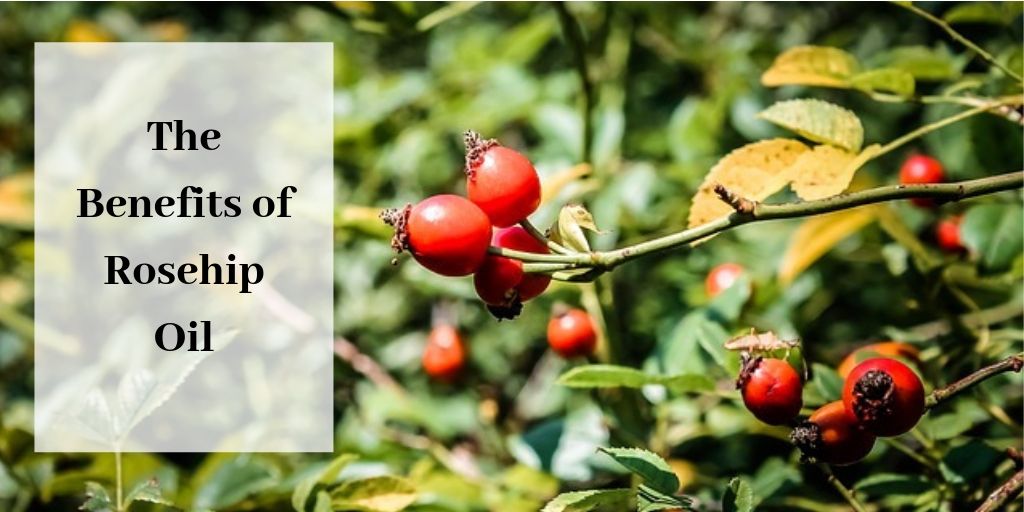Rosehip oil is a natural ingredient containing essential fatty acids, antioxidants, and an impressive array of vitamins, including vitamin A, which the skin adores. It hydrates, protects, and rejuvenates the skin. Add to all this, its anti-aging properties, and you’ve got a winner! Let’s talk about the benefits of rosehip oil for the skin.

Table of Contents
The New Coconut Oil
Referred to as “the new coconut oil” rosehip oil is so beneficial I wouldn’t dream of not including it as one of my go-to skin-care ingredients. This nourishing oil has been around for centuries, and its healing properties were enjoyed by both the Egyptians and Mayans. It is harvested in Chile from the seeds of rose bushes.
Rosehip oil is safe to use for those with sensitive skin as it doesn’t contain any potentially irritating ingredients like fragrances, and other synthetic additives that can burn the skin, and provoke breakouts. Although, an oil, it doesn’t feel heavy and greasy, and absorbs quickly into the skin.
In fact, rosehip oil is considered a dry oil, meaning it quickly penetrates the skin, is lightweight, and doesn’t leave a sticky, greasy residue. Wet oil, on the other hand, absorbs slowly, and feels heavier on the skin.
Dry oils, typically contain high amounts of beneficial polyunsaturated fatty acids. Squalane is another dry oil that I love. See below for more info on the nutrient profile of rosehip oil
[Read More: Squalane [A Natural Remedy For Beautiful Skin]
Nutrient Profile of Rosehip Oil
Antioxidants – Vitamins A, C and E are all antioxidants that fight free radical damage, stimulate collagen production, restore elasticity, and increase cell turnover. Vitamin C is an amazing antioxidant that boosts immunity, treats infections, and increases the proliferation rate of fibroblasts in the skin promoting recovery from injury.
Vitamin A heals damaged and dehydrated skin, smooth fine lines and wrinkles, diminishing the signs of aging. Vitamin E decreases inflammation, moisturizes, and extends the shelf life of rosehip oil.
Essential fatty acids – Rosehip oil contains generous amounts of the highly-nourishing omega 3 fatty acid, ALA. It also contains linoleic acid and GLA, both omega 6 fatty acids. These anti-inflammatory compounds convert to prostaglandins in the skin supporting cellular membrane and tissue regeneration. EFAs reduce scarring, and plump the skin for a more youthful appearance.
[Read More: 3 Benefits Of Using A Vitamin C Serum With Hyaluronic Acid]
Retinoic Acid
There’s no disputing the fact that vitamin A (retinol) is highly beneficial for the skin. Retinoic acid is a metabolite of vitamin A, and mediates its function. Rosehip oil is an excellent source of trans-retinoic acid – a natural from of vitamin A – and a great alternative to retinol without the annoying side effects.
Retinoic acid, or Tretinoin is used in well-known products, like, Retin-A and other pharmaceuticals. It is effective as an anti-wrinkle and acne cream, but has side effects that include; redness, stinging, dryness and swelling. Rosehip oil is a natural alternative, as it does contain retinoic acid, but in smaller amounts.
This beneficial acid encourages cell turnover, minimizes fine lines and wrinkles, reverses sun damage, and diminishes the appearance of scars. It is easily absorbed into the skin, preventing and reducing signs of aging, by regulating cell production.
The Benefits Of Rosehip Oil For The Skin
- Reduces fine lines and wrinkles
- Hydrates dry, itchy skin
- Plumps skin for a firmer complexion
- Protects the skin from sun and pollution damage
- Fights free radicals
- Supports tissue regeneration
- Treats age spots
- Reduces acne scars
- Smooths rough, flaky skin
- Restores elasticity
- Anti-inflammatory
- Treats dandruff and other scalp issues
How To Use Rosehip Oil
I use rosehip oil in my moisturizing lotion and vitamin C serum, but it can also be applied directly to the skin. Gently pat a few drops onto your skin, morning and night, to take advantage of its wonderful healing properties. A little goes a long way so don’t overdo it. I use rosehip powder to make my liposomal vitamin C. Vitamin C is great to use both externally and internally.
Quality matters with rosehip oil so look for 100% pure, unrefined, organic oil that has been cold pressed. This is important as it means the oil has not been heated, destroying the vital nutrients. Oh, and don’t forget to refrigerate your oil after opening to prevent rancidity.
Purchase rosehip oil here
Key Points
Rosehip oil is a natural skin-care ingredient packed with antioxidants, essential fatty acids, and retinoic acid making it a fabulous anti-aging oil to rejuvenate and nourish the skin. It’s also great for the hair and scalp. What are you waiting for? Take advantage of this skincare powerhouse, and turn back the clock today.
Have you used rosehip oil? I’d love to hear your experience? Let me know in the comments:)

Wow! I had no idea there were so many benefits of using rosehip oil! This is actually kinda mind-blowing haha I didn’t even know we could absorb fatty acids through the skin. I may sound kinda dumb, but I honestly have never heard of rosehip oil. This is legit! I’m really not familiar with any of this so I’m glad I’ve run into this site, I’ve definitely learned a lot today
Hi Misael,
Thanks for reading my article. Rosehip oil is one of my favorite skincare ingredients. I hadn’t heard of it until a few years ago. I add it to all my skincare concoctions, and it makes them that much better. Thanks so much for your comment:)